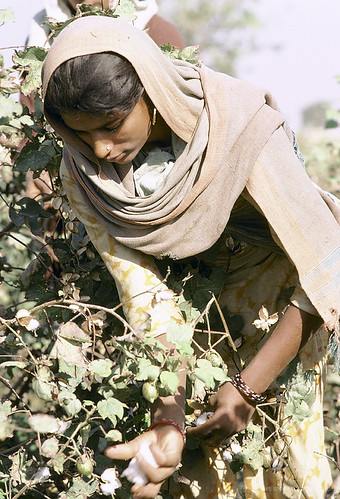 |
| Cotton harvest in India Photo: © Ray Witlin / World Bank Photo Collection on Flickr |
Monsanto first arranged an 'educational' trip for a group of journalists to farms of the Yavatmal district where the company has been selling Bt cotton seeds since 2002. This generated a story for the media to tell the world that the “Yavatmal district is known as the Suicide Capital of the state but two villages - Bhrambraja and Antargaon - are an aberration for the better. Not a single person from the two villages has committed suicide”. The positive experiences of these two villages apparently included “the ability of farmers to purchase on cash instead of credit” and to invest back into their farms.
The success story was supported by The Economic Times which rejected the farmer suicide-GM link. It reported that if you “Mention farmer suicides to any Yavatmal villager and he laughs ... We hear people in some villages have committed suicide over family disputes and alcoholism. But politicians think it is because of bad loans”.
This is impressive until you discover that the farmers showcased by Monsanto were all from a higher income group, none of them were ever marginal farmers (i.e. the ones who depend on loans to grow high-tech crops). Moreover, the two villages showcased were small islands in a sea of 1,845 other discontented villages. An internet search shows that at least three small-holders in these villages have committed suicide due to rising debts (the actual suicide rate is likely to be unreported, and much higher).
Since then, Mahyco/Monsanto's GM problems have refused to die down, and its PR machine has continued to tick over. For example, in 2010 Bt brinjal was banned by the Indian government (see GM AUBERGINES – GMFS News Archive, February 2010), and the company took several journalists from India on a free, fully-paid trip to a farm festival in America. This generated some suitably positive press coverage, (some front-page) but Monsanto's role in sponsoring the visit was not prominent nor was there any mention of the company's own deep corporate links with that particular farm show.
No surprisingly, 2011 has brought on its own PR migraine for Mahyco/Monsanto. In August the Association for Sustainable and Holistic Agriculture (a conglomerate of several civil society groups including Greenpeace) launched a 'Quit India' campaign against Monsanto for its “anti-farmer and monopolistic policies”. At almost the same time, the company found itself being prosecuted by the Indian authorities for biopiracy because it violated the rules in procuring local brinjal varieties for the development of its Bt brinjal (see INDIA'S GM AUBERGINES BECOME A TEST CASE FOR BIOPIRACY LAWS – November 2011). Worse trouble could be on the horizon for the biotech industry in the form of the 'Biotechnology Regulatory Authority of India Bill' which is shortly to be debated in the Indian Parliament: it is hugely in Monsanto's interest to influence the outcome of this.
What happened next may have been a knee-jerk reaction, or perhaps a sign that Monsanto's PR boys are running out of plausible tactics in India.
A full-page advertisement appeared in the Times of India. It had all the appearance of a news story, and was entitled “Reaping gold through Bt Cotton”. A group of labourers carrying baskets of cotton balls on their heads looked out of the page while the bottom half splashed success stories of two villages in Maharashtra where the villagers had apparently hit a gold mine. With anecdotes from three families, the story looked strikingly in-depth.
However, the article was nothing more than a re-hash of the 'news' concocted in 2008 which Monsanto had paid to have re-published.
OUR COMMENT
Presumably, Monsanto was unable to find another two villages with no Bt cotton problems in 2011 to create news with.
Let's hope that Monsanto is underestimating the level of awareness about the realities of growing GM crops in India, as it did in Europe in years gone by.
SOURCES
- Manu Moudgil, Media ethics: Got a plant, will republish for a fee, The Hoot, 6.09.11
- Kishor Tiwari, Letter to the Editor of the Times of India, 1.09.11
No comments:
Post a Comment
Thanks for your comment. All comments are moderated before they are published.